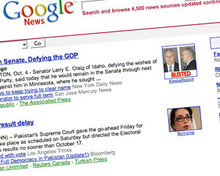
Early last month, Google struck a deal with several leading news agencies - Press Association and Associated Press included - allowing the aggregator to publish wire service stories.
Despite Google becoming a publisher of sorts, early data from Nielsen/NetRatings on weekly US unique users suggests the number of users looking at news publisher sites and Google News changed little in the three weeks following Google's first publication of wire service stories than from the five weeks prior to it.
Google News took an upturn in traffic the week following the deal, although not a significant one, before dropping to a level below any recorded in the previous few weeks - all the while recording significantly lower user figures than other major US news sources (see fig. 2).
Three weeks after the deal the New York Times and Gannett Newspapers were recording more users than at the time of its initiation (fig. 2).
The leading US online news source, Yahoo! News, recorded a slight decline in user figures (fig. 1).
(Figures are in 1000s - eg: in Fig.3, 61,032 equates to 61 million Americans having visited a Current Events & Global News site from home or work in the week of the 5th August)
Fig. 1
(Blue line denotes date Google started to publish wire stories)
Fig. 2
Despite early signs suggesting little change, the effect in the UK is not yet wholly known as Nielsen only publish user figures monthly for UK news sites - and figures from the ABCE for September are yet to be published - it may also be too soon after the deal to judge effects fully and thoroughly on all news services.
When news of the deal broke, it was welcomed in some quarters of the UK newspaper world. Others also recognised it would remove the clutter of duplicated stories making it easier to get to the original content on which those publications pride themselves.
Concerns still remain for some smaller publishers, however, that they may be crowded out by larger news suppliers if their original stories are covered by agencies, which then come to dominate them in Google News rankings.
Publishers may also suffer in others ways: while weekly or monthly user levels may not fall, the number of page views generated by each user may do so - impacting on advertising revenue - as users seek breaking news elsewhere.
Earlier this week MSN.co.uk's executive producer Peter Bale warned former employers, the Times, along with the Guardian and the Sun that they may experience a 'bump down' in traffic because of Google publishing news stories.
"While the agencies will consider it [the Google/agency deal] as welcome news, publishers should be very aware of what that really means to them," he said at the AOP conference, in London.
"I imagine that publishers such as the Times, the Guardian, the Sun, will start to see quite a bump down in traffic being generated from Google to them from that.”
At the same event Josh Cohen, Google News business product manager, rejected the notion that publishers would suffer from the deal, calling it a 'tremendous opportunity' for online newspapers.
"The issue we had for our users, we often have 50 different stories, half of those could be the exact same article," he told delegates.
"We try to categorise those articles as the same content and reward it by sending users to the originator of that content."
Fig. 3 - Total users of US news and current events sites for the period:
Fig.4 - Top ten US current events and global news sites for period:
Free daily newsletter
If you like our news and feature articles, you can sign up to receive our free daily (Mon-Fri) email newsletter (mobile friendly).
Related articles
- Post-Perugia thoughts: what went wrong between big tech and the news?
- Axel Springer CEO on OpenAI deal: 'We must protect intellectual property of news content'
- Audiences, AI and audio apps: five talking points from Perugia
- Protecting independent journalism, with Lexie Kirkconnell-Kawana of IMPRESS
- Why Australia's bid to make big tech pay for news failed: views from an indie publisher









